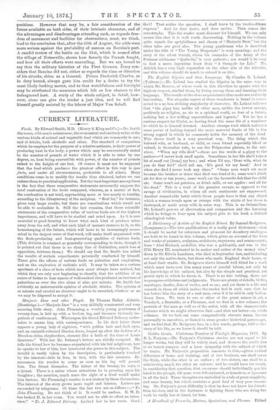The English Gipsies and their Language. By Charles G. Leland.
(Trilbner.)—Mr. Leland has studied the Gipsies in the same way iu
which Mr. Borrow, of whose work in this direction he speaks with the highest respect, studied them, by living among them and learning their language. The results of the close acquaintance thus made are curiously interesting. The singular aspect of these wanderers is found to corre- spond to a no loss striking singularity of character. Mr. Leland believes that "the gipsy has, unlike all other men, unlike the lowest savage, positively no religion, no tie to a spiritual world, no fear of a future, nothing but a few trifling superstitions and legends." Yet he has a curious respect for Christ, as having lived the same life of a wanderer to which he is himself devoted. Another strange trait which indicates some power of looking beyond the more material limits of life is the strong regard in which he commonly holds the memory of the dead This shows itself in a very practical way. The thing which the beloved wife, or husband, or child, or even friend especially liked or
valued, is thereafter tabu, to use the Polynesian phrase, to the sur-
vivor. "When my wife died "—these are the words of a gipsy to the author—"I never took snuff again. Sometimes in her life she'd take a bit of snuff out [from] my box ; and when rd. say, 'Dear wife, what do
you do that for ? ' she'd tell me, 'It's good for my hoed.' And so when she died I never took any since." "Some men won't eat raz.at
because the brother or sister that died was fond of it ; some won't drink ale for five or ten years; some won't oat the favourite fish that the child ate. Some won't eat potatoes, or drink milk, or eat apples : and all for the dead." This is a trait of the genuine savage, as opposed to the savage of civilisation, in whom all such sentiments are suppressed. Another remarkable habit which those people have is that any object which a woman treads upon or sweeps with the skirts of her dress is destroyed, or made away with in some way. This is an Orientalism. Mr. Leland's powers of observation and comparison and the learning which he brings to boar upon his subject give to his book a distinct ethnological value.


































 Previous page
Previous page